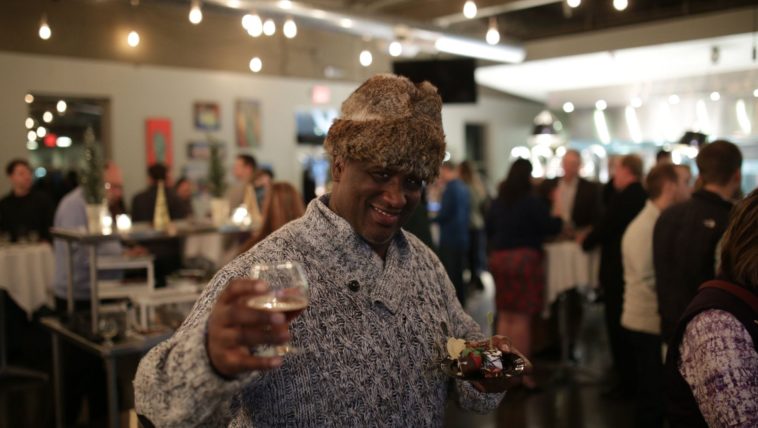Detroit publicist galvanized a team of Food Fighters to feed growing need amid COVID-19 – Detroit Free Press

| Detroit Free Press
Despite all the good work he was bound to do as organizer of Too Many Cooks In the Kitchen for Good, David Rudolph was feeling physically ill at the end of February 2020.
It had been an especially fruitful Black History Month for the well-known Detroit publicist and a few of his chef clients. Max Hardy held a successful pop-up series celebrating Black culture and Phil Jones had just become the first Black guest chef invited to cook at Google’s Detroit headquarters, among other PR wins.
Next on the agenda: getting Kuzzo’s Chicken & Waffles up and running again after seven long months of renovation and training.
But in the midst of it all, Rudolph at times felt like he was breathing underwater.
“You feel like you’re almost drowning while you’re standing on land,” Rudolph recalls. “I had that feeling and it was progressively getting worse.”
Food fighters: We had to change our Restaurant of the Year. What we’re doing instead
He wouldn’t know it until an antibody test confirmed it a few months later, but Rudolph’s flulike symptoms in late February were likely caused by COVID-19, despite Michigan not officially confirming its first two cases until March 10, 2020.
“Never did I think coronavirus,” he says. “There was no reason to because the government said it’s not here. So I just thought I’d power through it. On this side of it, I’m very lucky.”
By the time Kuzzo’s made the call to open a few days later despite the virus closing in, Rudolph was feeling better — just in time to switch to crisis mode and galvanize a team that included many of this year’s Detroit Free Press/Metro Detroit Chevy Dealers Food Fighters.
When it became evident a restaurant shutdown was coming, Rudolph began working the phones, checking in with his restaurant clients to determine who would be open for carryout and who was closing so that information could be telegraphed to the media.
“Once we knew who was going to be open and what they were going to do, chef Genevieve (Vang) said: ‘I have all this food. We should donate it to some kind of charity,'” Rudolph says. “Max had voiced the same thing, like: ‘What am I going to do with the perishable food I have? Let’s cook this off and let’s do something for charity.’”
At the same time, the Neighborhood Services Organization, an emergency shelter in Midtown where Rudolph has served on the board for 14 years, called him to ask whether he knew of any restaurants that could donate food. The shelter had no way to feed its people.
Hardy secured a kitchen to work from at the Horatio Williams Foundation, while Rudolph enlisted a few more of his restaurant and chef clients in the effort. On March 19 Too Many Cooks In the Kitchen for Good was born.
For the first three crucial months of the COVID-19 pandemic, the initiative fed the NSO, Alternatives for Girls, Detroit Rescue Mission Ministries and COTS.
“There was never an inclination to stop,” Rudolph says. “We said we were going to keep going until the restaurateurs would switch gears to reopening. The longer the governor kept us closed, it gave us more determination to keep going. Because we knew the need was out there. If we stopped, we left everybody hanging.”
By the summer, shelters began receiving Paycheck Protection Program loans, the food supply chain had improved drastically and the operators switched focus to getting their restaurants back open.
“It was truly beyond a labor of love,” says Rudolph, noting Too Many Cooks was not a nonprofit but a grassroots initiative built on donated time and food. “What we did often felt like it was life or death. We felt like if we didn’t do it, lives would be lost due to an inability to properly be fed.”
You could say he was just doing what a good PR man does: earning positive press for his clients, whose efforts were featured on the likes of CNN, the Root and in the local media.
But that superficial read of Too Many Cooks ignores the immense personal risk Rudolph and his team took on at a time when so little about the virus was known, as well as the strain it put on their families.
Looking back, Rudolph remembers feeling a calling to do the work, despite his wife, who is a public health professional, and teenage daughter pleading with him to stay home.
“We had tears in our private moments,” he says. “My wife was definitely concerned. She’s in health care and she’s begging me: ‘It is not safe for you. Please do not leave.’ And my daughter was very scared, too. Like, ‘Why is daddy doing this?’
“Even though my family was questioning: ‘Do you have to do this? There are other people who can do this,’ I said, ‘There isn’t. We are it. We’re doing this. And we have to do this.’”
Published at Thu, 11 Mar 2021 12:02:00 +0000






Comments
Loading…